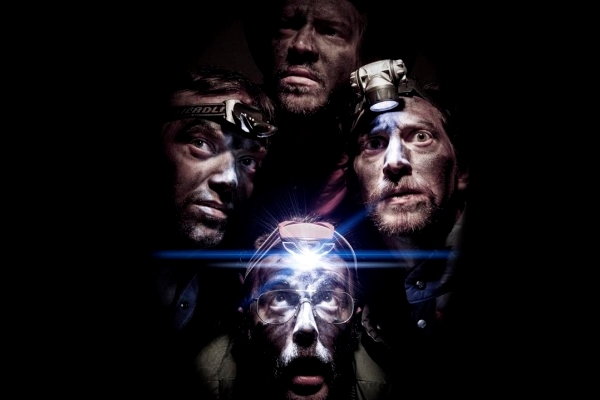Department of Theatre M.F.A. Candidate Brings 'Butcher Holler Here We Come' to Fayetteville

Actors from "Butcher Holler Here We Come," produced and featured by an M.F.A. theatre student, Cole Wimpee.
Butcher Holler Here We Come, a live theatre thriller created by independent New York City theatre company, Aztec Economy, will transform Fayetteville's Backspace into an immersive setting for three nights only running at 8 p.m. on Feb. 2, 3 and 4.
Butcher Holler Here We Come features Department of Theatre student, Cole Wimpee, who also co-produced the play that was written by his twin brother, Brooklyn-based playwright Casey Wimpee. Cole Wimpee, who is in his final year studying directing as a graduate student in the theatre program at the J. William Fulbright College of Arts and Sciences, arranged to fly in the New York-based actors to perform the show in Fayetteville.
The story, about five coal miners stuck in a cave collapse, examines psychological fear in a way that places the audience in the mine with the performers. It has received rave critical reviews from The New York Times, Baltimore Examiner, Austin Chronicle, New Orleans Defender and CityBeat Cincinnati.
In Butcher Holler Here We Come the coal miners struggle to survive the dwindling supply of oxygen, the lack of food and water, the unravelling sense of passing time, and, even more threatening, their own competing natures. By brutally weaving through family histories, complicated friendships, crooked politics, childhood visions, audacious hopes, eerie dreams, criminal addictions, and fervent spirituality in this run-of-the-mill Appalachian community, Butcher Holler Here We Come is a descent into the male psyche-in-crisis where secret desires, carnal urges and hidden memories come boiling to the surface in a primitive territory of Earth that mirrors the subliminal mind.
"It is a story that speaks to the devastating effects of unregulated industries," Cole Wimpee said. "Set in 1973, before coal mining in this country had fully unionized, the play uses that particular industry as a way to consider the human cost of any unchecked greed in society."
Wimpee said the economic and political morals of the play are just one aspect of the storytelling, and that after performing Butcher Holler Here We Come in 12 cities in five years for a total of 75 performances, the show has become known for its effect on its audiences.
"It's a psychological thriller, really," Wimpee said. "Even though its only a bit over an hour long, the audience gets lost in the dark rollercoaster ride and loses their own sense of time. We've had audience members literally jump out of their seats in fear at times. It's a lot of fun, but not for the faint of heart. I can say definitively that Fayetteville has never seen any theatre piece quite like this, and that is why I wanted to present it here – if only for three nights."
Seating capacity is limited, and tickets can be purchased at www.butcherholler.eventbrite.com for $15 in advance.
Topics
Contacts
Cole Wimpee, graduate candidate in theatre directing
Department of Theatre
347-496-4970,
jcwimpee@email.uark.edu
Headlines
PetSmart CEO J.K. Symancyk to Speak at Walton College Commencement
J.K. Symancyk is an alumnus of the Sam M. Walton College of Business and serves on the Dean’s Executive Advisory Board.
Faulkner Center, Arkansas PBS Partner to Screen Documentary 'Gospel'
The Faulkner Performing Arts Center will host a screening of Gospel, a documentary exploring the origin of Black spirituality through sermon and song, in partnership with Arkansas PBS at 7:30 p.m. Thursday, May 2.
UAPD Officers Mills and Edwards Honored With New Roles
Veterans of the U of A Police Department, Matt Mills has been promoted to assistant chief, and Crandall Edwards has been promoted to administrative captain.
Community Design Center's Greenway Urbanism Project Wins LIV Hospitality Design Award
"Greenway Urbanism" is one of six urban strategies proposed under the Framework Plan for Cherokee Village, a project that received funding through an Our Town grant from the National Endowment for the Arts.
Spring Bike Drive Refurbishes Old Bikes for New Students
All donated bikes will be given to Pedal It Forward, a local nonprofit that will refurbish your bike and return it to the U of A campus to be gifted to a student in need. Hundreds of students have already benefited.




